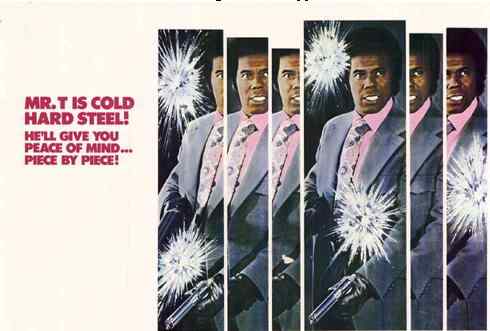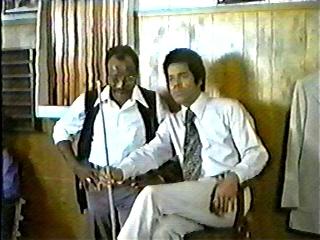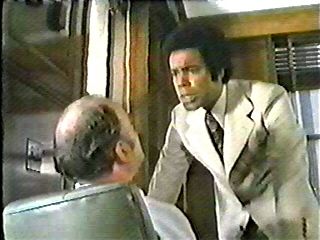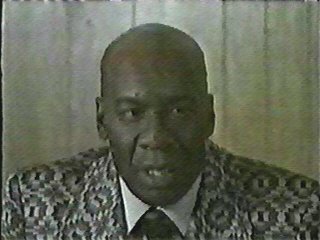
|
|
|
|
|
|
|
|
|
|
|
|
|
(1972) Director: Ivan Dixon
If you are as cool, hip, and with-it like I am, then
it's doubtless that sometime in the past while you have come across the
quote "jumping the shark", and know what it means. To those who
haven't, a quick explanation; derived from an episode of Happy Days,
the quote is used to describe something that has made some sort of
fatal step or steps that, as a result, signals that it will never again
reach the peak it was once at. This can be used on people as well;
Steven Segal jumped the shark with On Deadly Ground,
and Arnold Schwarzenegger did so with The Last Action Hero.
But the quote is mostly used for Apparently, though, his biggest dream wasn't any of those two things, and not even acting. What he seems to have been working up to was a career in directing, and he finally got his first directing gig in the early '70s, being one of the first black mainstream Hollywood directors. For the next 20 years he collected an impressive number of television credits from directing shows like The Rockford Files, Magnum P.I., and Quantum Leap. There were two non-television exceptions, though - the somewhat obscure The Spook Who Sat By The Door (which he also produced), and the blaxploitation actioner Trouble Man. Before going any further, I feel I should go into some detail about my opinion of the movies that came out of the blaxploitation genre. Overall, my feeling of the genre is not that much higher than how I feel about motorcycle movies; I like the idea of what's to be found in these movies (in this case, the music, clothes, action, attitude, etc.), but most of the time I find these elements haven't been put together well enough to make a likeable whole. However, there have been a few done well enough to keep me interested enough in the genre so that I still seek them out. (One of my favorites is Shaft In Africa, which I think is far better than the previous two in the trilogy.) Even hearing negative reports about any particular ones doesn't necessarily dissuade me; in fact, my long-time interest in seeing Trouble Man was because it was included in the notorious book The Fifty Worst Films Of All Time. Upon finally getting a copy and sitting down to watch
it, I didn't think it would be that bad - for one thing, no
blaxploitation movie could possibly be worse than Blackenstein -
but I did feel that it was probably pretty bland and mediocre,
considering that it's been all but forgotten and has never been given a
release on video or DVD. Imagine my delightful surprise to find that
the movie wasn't terrible or even mediocre. In fact, I loved
it. Among the many delights I found was evidence that maybe the movie
was intended as a (very) subtle parody of the genre. I can't be sure of
this, but I can easily picture Dixon sitting Let me tell you something right now. Forget Superfly. Forget John Shaft. Even forget what's-his-name in Black Caesar. (Hmm, guess I've already started to do so for that last character.) None of these or any other blaxploitation characters even approaches the utter cool that is Mr. T. To begin with, he's incredibly rich - he drives a really sweet car, owns a really big fancy house, and has a closet completely filled with $500 suits. In fact, except for one short scene, he is always wearing one of those suits. If Mr. T feels he'll be in a precarious situation that may mess up his suit, no trouble - he always keeps a freshly pressed spare suit in his car so he can quickly change and make a nice clean getaway (in more ways than one.) Though only once does he have to do so; every other time he gets the job done incredibly neatly. For example, when a doorman gives him some light-hearted ribbing, T completely pulverizes the guy in two seconds with some well-placed chops and kicks without putting one crease in his suit. Yes, T is also a master of the martial arts. He's also an expert on shooting as well. There is the less obvious kind, which is seen early on in the pool hall; when a champion pool player all the way from Texas challenges T to a game, T whips the guy's butt. Then there is the more obvious kind, concerning firearms; though T doesn't do that much gunplay, he never seems to miss the few times he does. He's also an expert at getting guns as well. If he should need a gun but be without one, he does the obvious thing - secretly steal some from the evidence room at the local police station. It seems like T is an expert on everything.
There is often danger in having a character in a movie to be virtually
or completely flawless, because it's hard to build excitement if you
know the character can easily get out of a bad situation - let alone
attempt to build empathy for that same character. However, this problem
doesn't happen in Trouble Man, because T's perfection
soon becomes so unbelievable that it becomes amusing to watch. Take the
time when he sneaks While T's ultra-perfection is funny by itself, what really makes him a delight to watch is his attitude towards everything. Although he has one scene with his girlfriend (played by former Playboy playmate Paula Kelly) where he shows a reasonable amount of tenderness, other than that he's never less than stern and arrogant, sometimes incredibly so that you just have to laugh. It's a wonder he even has a girlfriend, since when she expresses how much she cares and worries about him during a telephone call, T lazily yawns out "Later," and immediately hangs up the phone. Don't get me wrong; T does care about her. When later in the movie it seems her life must be in danger, T immediately calls her... though right after she says hello, T yells, "Pack your bags - you're going out of town!" - and immediately hangs up before she has a chance to say anything. So you can't say T is without love. (In fact, he has enough love to have more than one girl on the side, and makes another girlfriend in the last two minutes of the movie.) However, it is pretty incredible that T manages to stay in business. T is actually first approached by someone who works for Chalky, but he tells the goon that Chalky "can kiss my black ass," and walks away. When Chalky and Pete come to directly negotiate with him, he freely insults them and their initial offer for several minutes. Then when they make some kind of mutual arrangement, T then stops his car in the middle of nowhere and hustles them out, despite having several hours to kill before he can properly start his assignment. T's behavior is so incredibly rude that it's
unbelievable, especially considering that nobody at any time seems
willing to respond with some kind of protest. There's absolutely no way
you can take this character seriously. He is really a cartoon
character, a caricature of the typical blaxploitation hero. You can't
help but be amused by him, no matter how bad his manners get. And
Robert Hooks fits the part of T so perfectly you would There actually isn't that much action in Trouble Man - the little there is mostly happens in the last 15 minutes or so. At least the few action scenes are all very well directed by Dixon, swiftly paced and exceedingly brutal, with professional-looking bullet wounds spilling great gobs of blood (though of the familiar red paint-kind of the era.) Also unlike other blaxploitation movies, there is a remarkable total lack of nudity and sex, though in one scene Kelly wears an almost see-through top (sigh.) While the movie may be mostly free of action and sex, Dixon keeps the interest level high at all times. He wisely keeps the focus firmly on T, since the character is so off-beat he obviously knew he didn't have to add much of a personal touch to try and liven things further. As well, the screenplay (written by the same screenwriter as Shaft) itself is fast-paced, creating a new turn in the plot every few minutes, and changing locations almost as quickly. The screenplay also has some touches you usually don't see in blaxploitation. For example, police captain Marx (William Smithers, Dallas) dislikes T not because he's black, but because he knows T is constantly bending the law to his advantage - which is shown to be true. The dialogue also really crackles, often having a fancy flair to it that comes across as a seed to the post-Pulp Fiction era. Though occasional lines like "Up yours, mother Marx!" and "T has one advantage, and that's his cool," are further clues the screenwriter wasn't taking this assignment too seriously. Another atypical touch, and another reason why this entry in the genre is atypically good.
Check for availability on Amazon (DVD) See also: The Black Godfather, Strange Shadows In An Empty Room, Tougher Than Leather |
 TV shows.
For instance, I believe that Hogan's Heroes jumped the shark
when star Ivan Dixon ("Sgt. James Kinchloe") departed. Sure, he was
quickly replaced by Kenneth Washington, but it just wasn't the same.
Dixon added that spark, that extra bit of sunshine to the going-ons.
You could always tell he was filled with ambition, and wanting to
expand his range of talents. For instance, while Bob Crane, Werner
Klemperer, and John Banner refused to do so, Dixon eagerly joined the
rest of the cast to record the music album Hogan's Heroes Sing The
Best Of World War II (which gave long-waiting listeners the chance
to finally hear the lyrics for the theme song.) Dixon's ambitions did
not cease once he left the show. As of this date, he is an owner of a
radio station in Hawaii. And even before Hogan's Heroes, Dixon
was involved in an impressive number of activities, from athlete to
stunt double.
TV shows.
For instance, I believe that Hogan's Heroes jumped the shark
when star Ivan Dixon ("Sgt. James Kinchloe") departed. Sure, he was
quickly replaced by Kenneth Washington, but it just wasn't the same.
Dixon added that spark, that extra bit of sunshine to the going-ons.
You could always tell he was filled with ambition, and wanting to
expand his range of talents. For instance, while Bob Crane, Werner
Klemperer, and John Banner refused to do so, Dixon eagerly joined the
rest of the cast to record the music album Hogan's Heroes Sing The
Best Of World War II (which gave long-waiting listeners the chance
to finally hear the lyrics for the theme song.) Dixon's ambitions did
not cease once he left the show. As of this date, he is an owner of a
radio station in Hawaii. And even before Hogan's Heroes, Dixon
was involved in an impressive number of activities, from athlete to
stunt double. behind
the camera laughing his head off while watching the hero of his movie
in action. The hero of the movie is Mr. T. No, not the Mr. T we all
know and love - this Mr. T (who's only referred to as this and "T"
throughout the movie) is played by Robert Hooks, star of movies like Hurry
Sundown and Star Trek III. "T" is a kind of
Jack-of-all-trades working out of his pool hall headquarters in South
Central L.A. He does everything from being a licensed private
detective, all the way to helping out a poor family in need by
threatening someone with severe bodily harm (it's a long story.) One
day, Chalky (Winfield, 227) and Pete (Waite, Sunshine
State) come by to hire him to help figure out who keeps raiding
and stealing from their gambling operation. Initial evidence points to
local kingpin "Big" (blaxploitation regular Julius Harris), but as the
investigation continues, "T" soon finds himself what an ordinary person
would consider trouble... but don't underestimate the trouble man.
behind
the camera laughing his head off while watching the hero of his movie
in action. The hero of the movie is Mr. T. No, not the Mr. T we all
know and love - this Mr. T (who's only referred to as this and "T"
throughout the movie) is played by Robert Hooks, star of movies like Hurry
Sundown and Star Trek III. "T" is a kind of
Jack-of-all-trades working out of his pool hall headquarters in South
Central L.A. He does everything from being a licensed private
detective, all the way to helping out a poor family in need by
threatening someone with severe bodily harm (it's a long story.) One
day, Chalky (Winfield, 227) and Pete (Waite, Sunshine
State) come by to hire him to help figure out who keeps raiding
and stealing from their gambling operation. Initial evidence points to
local kingpin "Big" (blaxploitation regular Julius Harris), but as the
investigation continues, "T" soon finds himself what an ordinary person
would consider trouble... but don't underestimate the trouble man. into a
building to knock off an enemy, a building that he hasn't been in
before. How did T know how to sneak past the security guard? How did he
know there was a forgotten dumb waiter in the basement he could use to
sneak upstairs? There is absolutely no way he could have learned all
this, at least in the short time he had. Other scenes are even more
unbelievable than this, and it's hilarious to constantly see T putting
himself or being placed in a risky situation with little to no previous
planning, and seeing him effortlessly making things right at an
unbelievable speed. (Perhaps T is also blessed with psychic powers - if
so, this ultra-perfection makes his character even funnier to watch.)
into a
building to knock off an enemy, a building that he hasn't been in
before. How did T know how to sneak past the security guard? How did he
know there was a forgotten dumb waiter in the basement he could use to
sneak upstairs? There is absolutely no way he could have learned all
this, at least in the short time he had. Other scenes are even more
unbelievable than this, and it's hilarious to constantly see T putting
himself or being placed in a risky situation with little to no previous
planning, and seeing him effortlessly making things right at an
unbelievable speed. (Perhaps T is also blessed with psychic powers - if
so, this ultra-perfection makes his character even funnier to watch.) almost
swear that the movie was originally written for him. Knowing his
background, you can see from his performance that Hooks remembered his
training from Broadway and the Negro Ensemble Company. He obviously
learned how to get hundreds of eyes at once to focus on him, and he
uses the same techniques here to keep the audience's attention. Even
when his character is just standing around, Hooks stands tall and
confident, and seems to be holding back a supply of brutal energy that
he feels free to let out whenever he wants. When T talks, Hooks gives
him a voice that simultaneously shows casualness and confidence; from
the voice alone you can tell T has seen it all before, and knows
exactly what to do. Hooks even does well when his role turns physical.
Though he almost certainly didn't have any martial arts training before
signing on, he freely jumps into the action (literally at times), and
his chops and kicks have real power to them.
almost
swear that the movie was originally written for him. Knowing his
background, you can see from his performance that Hooks remembered his
training from Broadway and the Negro Ensemble Company. He obviously
learned how to get hundreds of eyes at once to focus on him, and he
uses the same techniques here to keep the audience's attention. Even
when his character is just standing around, Hooks stands tall and
confident, and seems to be holding back a supply of brutal energy that
he feels free to let out whenever he wants. When T talks, Hooks gives
him a voice that simultaneously shows casualness and confidence; from
the voice alone you can tell T has seen it all before, and knows
exactly what to do. Hooks even does well when his role turns physical.
Though he almost certainly didn't have any martial arts training before
signing on, he freely jumps into the action (literally at times), and
his chops and kicks have real power to them.